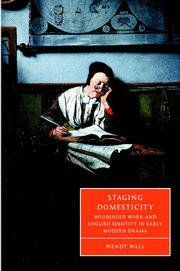Description
Staging Domesticity
Household Work and English Identity in Early Modern Drama
Cambridge Studies in Renaissance Literature and Culture Series
Author: Wall Wendy
Interprets plays in light of their representations of domestic life in the early modern period.
Language: EnglishApproximative price 148.11 €
Subject to availability at the publisher.
Add to cart
Staging domesticity household work and english identity in early modern drama
Publication date: 01-2002
308 p. · 16x23.6 cm · Hardback
Publication date: 01-2002
308 p. · 16x23.6 cm · Hardback
Approximative price 28.95 €
Subject to availability at the publisher.
Add to cart
Staging domesticity: household work and english identity in early modern drama
Publication date: 11-2006
308 p. · 15.2x22.8 cm · Paperback
Publication date: 11-2006
308 p. · 15.2x22.8 cm · Paperback
Description
/li>Contents
/li>Biography
/li>
What role does food and cooking play in how people imagine themselves and their communities? In this book Wendy Wall argues that representations of housework in the early modern period helped to forge crucial conceptions of national identity. Rich with a detailed account of household practices in the period, Staging Domesticity reads plays on the London stage in the light of the first printed cookbooks in England. Working from original historical sources on wetnursing, laundering, sewing, medical care and butchery, Wall shows that domesticity was represented as deeply familiar but also enticingly alien. Wall analyses a wide range of the repertoire, including some now little-known plays, as well as key works in the period by Shakespeare and others. Wall concludes that, rather than dramatizations of only court-based and aristocratic domestic life, literature of the period drew on work from the more common household.
List of illustrations; Acknowledgements; Introduction: in the nations' kitchen; 1. Familiarity and pleasure in the English household guide, 1500–1700; 2. Needles and birches: pedagogy, domesticity, and the advent of English comedy; 3. Why does Puck sweep? Shakespearean fairies and the politics of cleaning; 4. The erotics of milk and live food, or, ingesting early modern Englishness; 5. Tending to bodies and boys: queer physic in Knight of the Burning Pestle; 6. Blood in the kitchen: service, taste, and violence in domestic drama; Notes; Bibliography; Index.
Wendy Wall is Associate Professor of English Literature at Northwestern University and a scholar of early modern literature and culture. She is the author of The Imprint of Gender: Authorship and Publication in the English Renaissance (Cornell University Press, 1993) and co-editor of the journal Renaissance Drama. Wall has published widely on print technology, voyeurism, women's writing, poetry, housework, and early modern culture.
© 2024 LAVOISIER S.A.S.





